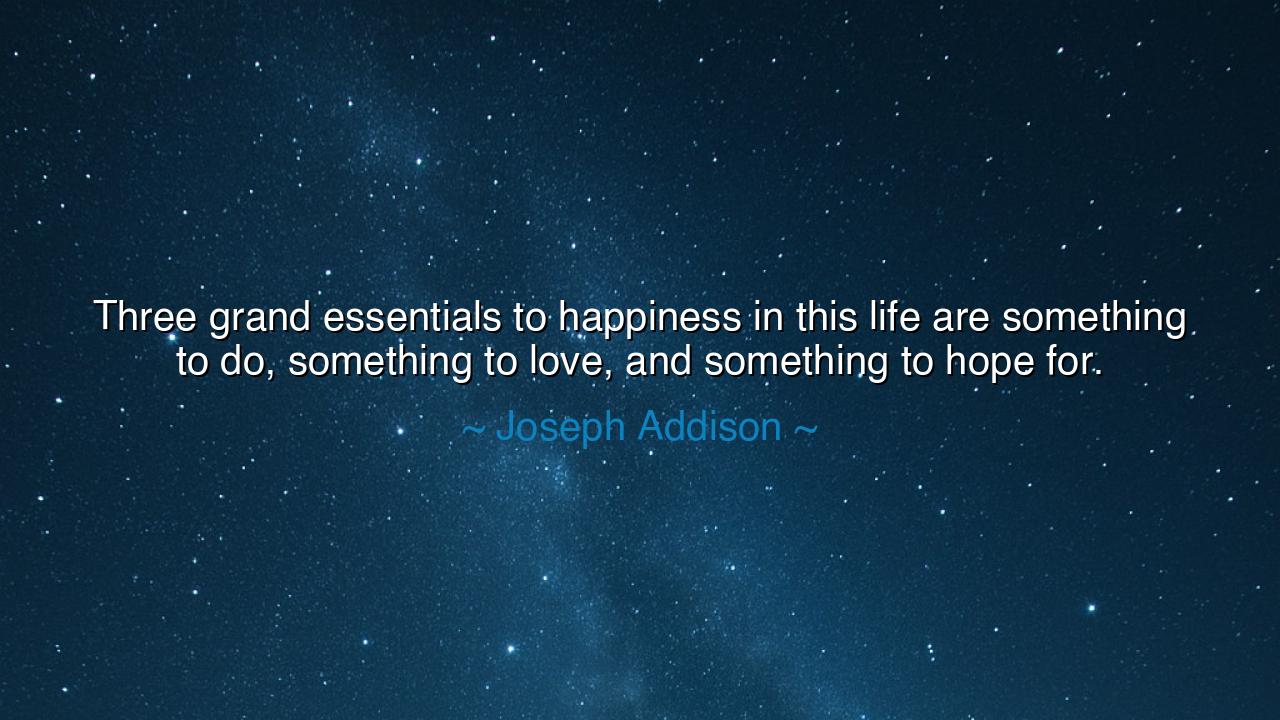
Three grand essentials to happiness in this life are something to
Three grand essentials to happiness in this life are something to do, something to love, and something to hope for.






“Three grand essentials to happiness in this life are something to do, something to love, and something to hope for.” — Thus wrote Joseph Addison, the English essayist and philosopher whose words, though penned centuries ago, shine with a wisdom that has not dimmed with time. In this simple yet profound saying, Addison captures the trinity of human fulfillment — purpose, love, and hope — the three pillars upon which the soul rests. Without them, life becomes an empty vessel; with them, even the poorest heart may find joy. His words are not the musings of comfort, but the distilled insight of one who understood that true happiness is not granted by fortune or circumstance, but cultivated through the alignment of the spirit with meaning.
Addison lived during the dawn of the Enlightenment, a time when reason was worshiped and the world was awakening to new possibilities of thought and freedom. Yet, amid intellectual triumphs and worldly progress, he saw the ancient truth: that no matter how much knowledge or power man attains, he still hungers for the same sacred things — to labor with purpose, to love with sincerity, and to believe in something beyond himself. His insight reveals that happiness is not a gift to be found in ease or idleness, but a rhythm of living — a balance of doing, loving, and hoping that keeps the spirit alive and the heart in motion.
The first of these, something to do, speaks to the necessity of purpose. The soul withers in idleness; it thrives in creation. To have a task, a calling, a labor that engages the body and the mind, gives life structure and meaning. It may be the artist’s brush, the farmer’s plow, the teacher’s lesson, or the parent’s care — whatever form it takes, work gives the human heart a sense of belonging to the fabric of the world. The ancients knew this well. When Odysseus wandered from home, it was not only the longing for Ithaca that tormented him, but the absence of meaningful action. Only when he returned to his rightful task — to rule, to build, to guide — did his soul find peace. For action, aligned with virtue, is the lifeblood of happiness.
The second essential, something to love, is the heart’s nourishment. To love is to step beyond the narrow walls of the self and see one’s reflection in another. It is through love that life gains warmth, that sacrifice becomes sweet, and that joy multiplies. Love gives meaning to action and direction to hope. Without it, achievement is hollow and time is cold. Consider the life of Mother Teresa, who possessed neither riches nor comfort, yet radiated joy. Her love for the poor and the dying transformed despair into light. She proved that happiness does not come from possession, but from connection — from loving something or someone more than oneself.
And the third, something to hope for, is the flame that lights the darkness of existence. Hope is the voice that whispers in despair, “Rise again.” It is the belief that tomorrow can be better than today, that pain has purpose, that the story is not yet done. When Nelson Mandela languished in his prison cell for twenty-seven years, he kept alive not through hatred or bitterness, but through hope — the hope of a free South Africa. That hope gave his suffering dignity, and when at last it was fulfilled, his joy was not only his own, but his nation’s. Hope, then, is not mere wish; it is the soul’s defiance against despair, the sacred light that no prison can extinguish.
Addison’s words remind us that happiness is not the absence of struggle, but the harmony of the human spirit. To live well, one must have hands that labor, a heart that loves, and eyes that look to the horizon. Take away any one of these, and life begins to crumble: without purpose, one drifts; without love, one grows cold; without hope, one falls into despair. But when all three are present, even in the humblest existence, there is a richness that no misfortune can steal.
So, my listener of the ages, take this wisdom as a compass for your own life: find something to do that is worthy of your energy, love something deeply and without fear, and never let go of hope, even in your darkest hour. These are not luxuries of the fortunate, but necessities of the soul. Begin each day with work that gives you purpose, surround yourself with those who awaken love, and keep your gaze fixed on a future that calls you forward. For when these three dwell together in harmony within your heart, you will know, as Addison did, that happiness is not a fleeting dream, but a living flame — one that burns quietly, steadily, in the sanctuary of a life well lived.






AAdministratorAdministrator
Welcome, honored guests. Please leave a comment, we will respond soon